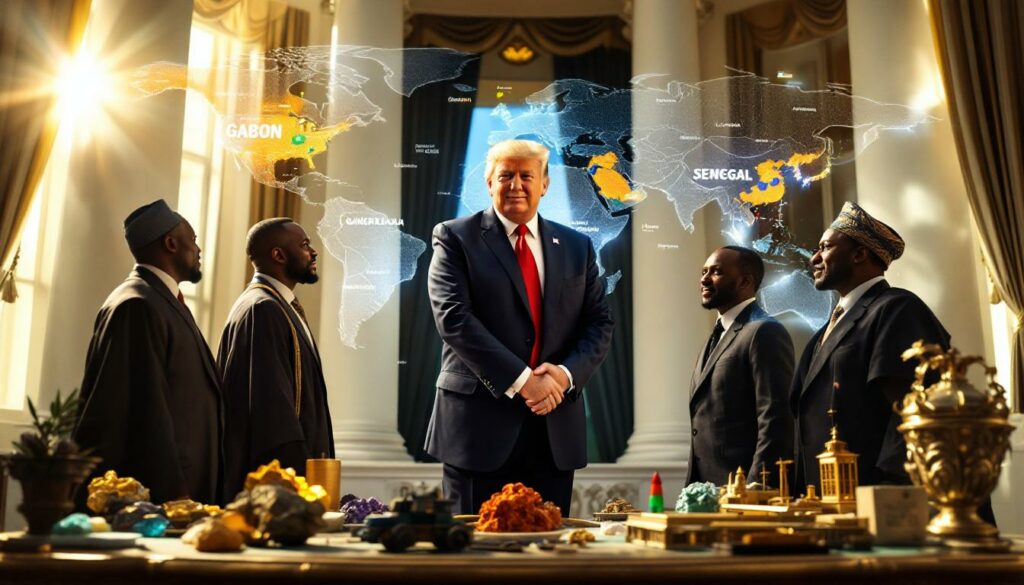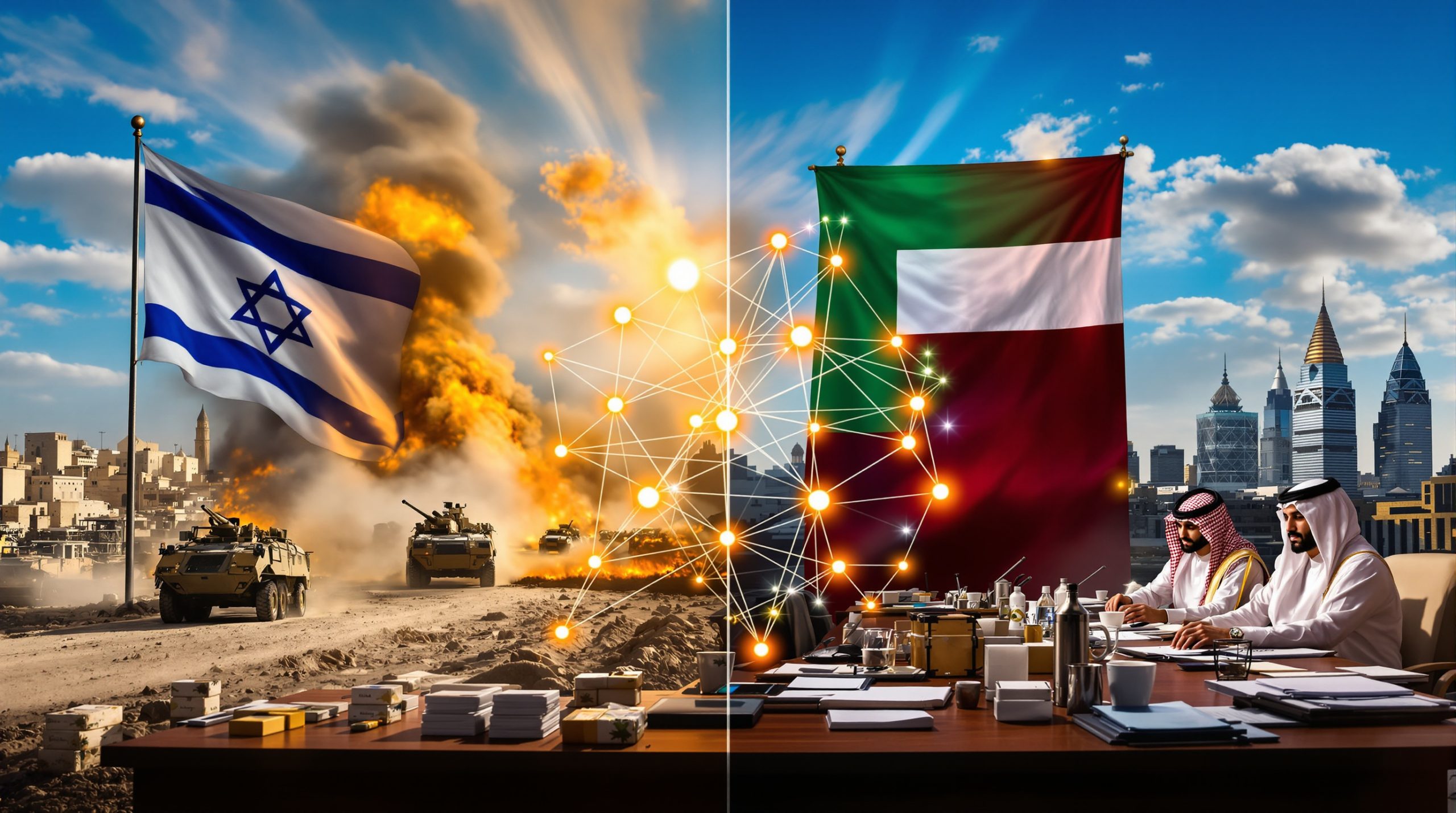Trump's African Summit: Mining Ventures and Strategic Partnerships
The upcoming three-day White House summit beginning July 10, 2025, will bring together President Donald Trump and leaders from five resource-rich African nations—Gabon, Guinea-Bissau, Liberia, Mauritania, and Senegal. This high-level meeting focuses primarily on developing American business opportunities in critical minerals energy transition and natural resources, a strategic priority for the U.S. administration.
While the participating nations represent smaller African economies with a combined GDP of approximately $75 billion according to International Monetary Fund data, they possess significant mineral wealth and untapped resource potential perfectly aligned with U.S. strategic interests. The summit aims to establish new partnerships that benefit both American businesses and these African nations.
As Gabon's Ambassador to the U.S., Noël Nelson Messone, emphasized in a recent statement: "The president of the republic is keen to see Gabon's natural resources processed locally to add value to the economy, diversify the economy and create jobs" (Mining Weekly, 2025).
Which African Countries Are Participating in the Summit?
Gabon
Gabon stands as the world's second-largest producer of manganese, an essential mineral used in steel hardening and various industrial applications. The country also possesses substantial high-grade iron ore deposits and maintains membership in OPEC with significant oil reserves.
In June 2025, Gabon's government signed a $3.8 billion agreement with the African Export-Import Bank focused on mineral development and infrastructure improvements. This pre-summit deal signals Gabon's commitment to expanding its resource sector through international partnerships.
The country's leadership has expressed particular interest in developing local processing capabilities rather than simply exporting raw materials—a value-addition strategy that could transform Gabon's economic landscape while creating substantial employment opportunities.
Guinea-Bissau
Though currently a smaller player in the global minerals market, Guinea-Bissau shows emerging potential in bauxite (aluminum ore) and phosphate exploration. The country recently strengthened its resource development position by signing four cooperation agreements with Russia in February 2025, focusing on oil, gas, and mineral prospecting.
Russian aluminum producer United Rusal International PJSC has announced plans to begin mining operations in the country, highlighting the growing international interest in Guinea-Bissau's mineral potential.
Beyond resource development, Guinea-Bissau maintains security cooperation with the United States, particularly through the U.S. Drug Enforcement Agency's collaboration on anti-trafficking initiatives—a partnership that demonstrates the multifaceted nature of U.S.-African relations.
Liberia
Liberia recently made headlines with a $1.8 billion agreement with Ivanhoe Atlantic (majority-owned by mining magnate Robert Friedland's Ivanhoe Mines). This landmark deal includes rehabilitation of critical railway infrastructure designed to transport iron ore from neighboring Guinea through Liberian territory to export facilities.
The country has discovered significant deposits of critical minerals essential for modern technology, including lithium, manganese, cobalt, and neodymium—elements vital for everything from electric vehicle batteries to renewable energy systems and defense technologies.
With an ambitious target of $3 billion in new mining investment opportunities, Liberia aims to capitalise on its mineral wealth while leveraging its historical ties to the United States as a nation founded for freed American slaves in the 19th century.
According to the Liberian Observer, the country "plans to lobby for U.S. investment in natural resources, including fisheries" (Mining Weekly, 2025), demonstrating a diversified approach to resource development.
Mauritania
Mauritania recently began gas production from BP's Greater Tortue Ahmeyim development, marking a significant milestone in the country's energy sector evolution. The government aims to leverage gas projects to industrialise its economy, creating downstream value and reducing dependence on raw material exports.
The U.S. International Development Finance Corporation is currently assessing a uranium mining in Africa project in Mauritania, highlighting American interest in the country's diverse resource portfolio beyond conventional oil and gas.
Mauritania's strategic location in the Sahel region also makes it a valuable security partner as the United States seeks to maintain influence in an area challenged by insurgency and political instability.
Senegal
Senegal recently joined the ranks of liquefied natural gas (LNG) exporters, with shipments beginning earlier in 2025. The country has ambitious plans to develop over three gigawatts of gas-to-power capacity by 2050, creating significant infrastructure investment opportunities.
Beyond energy resources, Senegal is actively seeking $1.7 billion in investment for digital infrastructure development—a forward-looking approach that combines traditional resource development with technology sector growth.
The country's growing importance in regional security cooperation complements its resource development agenda, making it a valuable strategic partner for the United States in West Africa.
Why Are Major African Economies Absent from the Summit?
Notably absent from the gathering are leaders from Africa's largest economies, including South Africa and Nigeria. South Africa currently faces the introduction of a 30% reciprocal tariff by the Trump administration, creating significant trade tensions that likely contributed to its exclusion from the summit.
Nigeria, the continent's largest oil producer, is also missing from the attendee list despite its significant energy resources. This selective invitation approach suggests a strategic decision to focus on developing new partnerships with smaller, resource-rich nations rather than engaging with established economic powers where relationships may be more complex or strained.
The focus on countries with substantial untapped potential rather than existing economic powerhouses indicates a forward-looking approach to resource security and influence-building on the continent.
What Strategic Interests Does the Summit Serve?
Mineral Resource Security
The summit highlights the growing importance of securing supply chains for critical minerals essential for technology, defense, and energy transition. The participating nations offer diverse resources including:
- Battery minerals: Lithium, cobalt, and manganese (essential for electric vehicle and energy storage technologies)
- Industrial metals: Iron ore and bauxite (foundational materials for manufacturing and construction)
- Energy resources: Oil, gas, and uranium (powering both traditional and next-generation energy systems)
- Agricultural inputs: Phosphates (critical components for fertilizer production)
As global competition for these resources intensifies, especially with China's dominant position in many critical mineral supply chains, the United States is strategically diversifying its resource partnerships to reduce dependencies and vulnerabilities.
Regional Security Cooperation
Four of the five participating nations—Guinea-Bissau, Liberia, Mauritania, and Senegal—are situated on the periphery of the Sahel region, which has experienced significant security challenges over the past decade:
- A persistent Islamist insurgency threatening regional stability
- Multiple military coups disrupting governance structures
- Strained U.S. relations with Burkina Faso, Mali, and Chad
- Forced closure of the U.S. drone base in Niger in 2024
The summit provides a critical opportunity to strengthen security partnerships in a strategically important region where U.S. influence has recently diminished. New security agreements could help restore counterterrorism capabilities lost with the Niger base closure while building relationships with more stable governments on the Sahel's periphery.
What Investment Opportunities Are Being Discussed?
Mineral Processing and Value Addition
A recurring theme among participating nations, particularly emphasized by Gabon's leadership, is the desire to move beyond raw material extraction to develop local processing capabilities. This value-addition approach creates more jobs, diversifies economies, and generates greater long-term value than traditional extraction-only models.
Investment opportunities in processing facilities for manganese, iron ore, bauxite, and other minerals represent a significant shift from historical resource development patterns in Africa, which often focused exclusively on extraction for export.
Infrastructure Development
The $1.8 billion Liberian railway agreement with Ivanhoe Atlantic demonstrates how infrastructure development is intertwined with resource extraction. Similar projects focusing on ports, railways, roads, and power generation could emerge from the summit as countries seek to improve transportation networks for mineral exports.
These infrastructure investments create immediate construction jobs while establishing the foundation for long-term economic growth and resource development—a win-win for both investors and host nations.
Energy Transition Projects
With significant gas resources in Mauritania and Senegal, discussions may include investments in energy infrastructure that could support both industrial development and cleaner energy generation compared to coal or oil. Senegal's 3+ gigawatt gas-to-power capacity goal by 2050 represents a significant investment opportunity in this sector.
As global energy systems transition toward lower-carbon options, these nations offer resources and development pathways that align with both economic development and environmental objectives.
Digital Infrastructure
Senegal's $1.7 billion digital infrastructure investment goal indicates that technology and connectivity will be part of the conversation, potentially opening opportunities for U.S. technology companies. Digital infrastructure not only supports resource sector operations but also enables broader economic diversification and modernisation.
How Does This Summit Fit into Broader U.S.-Africa Relations?
The summit represents a targeted approach to U.S.-Africa engagement, focusing on countries with specific resource advantages rather than the continent's economic powerhouses. This strategy marks a significant shift in America's African diplomacy approach.
Resource Security Focus
The Biden administration had previously emphasized climate partnerships and democratic values in Africa. The current summit signals a strategic pivot toward securing critical minerals strategy amid growing global competition, particularly with China and Russia.
This change reflects growing recognition of Africa's crucial role in global resource security, especially for minerals essential to advanced technologies and defense systems.
Countering Russian Influence
Guinea-Bissau's recent agreements with Russia for mineral exploration highlight the competitive landscape for African resources. The summit may be partly aimed at offering alternatives to Russian partnerships at a time of heightened geopolitical competition.
Russian interest in African resources has grown significantly in recent years, with both state companies and private entities like United Rusal expanding their presence across the continent.
Security Realignment
With the U.S. losing military positioning in the Sahel region, building relationships with countries on the periphery of this zone could help maintain regional influence and counter-terrorism capabilities. The summit offers an opportunity to establish new security frameworks with countries strategically positioned around the Sahel's unstable core.
Trade and Investment Approach
The focus on business opportunities rather than aid suggests an emphasis on mutually beneficial economic relationships rather than traditional development assistance. This commercial-first approach marks a departure from historical development-focused engagement with African nations.
What Are the Potential Outcomes of the Summit?
Resource Development Agreements
Following Liberia's pre-summit announcement of the Ivanhoe Atlantic deal, other participating countries may announce similar agreements with U.S. companies for mineral exploration and development. These could range from early-stage exploration projects to major production agreements for critical minerals.
The deals may include innovative approaches to resource governance, environmental management, and community benefits that distinguish American partnerships from those offered by competing nations.
Security Cooperation Frameworks
New security agreements could emerge, particularly with countries bordering the unstable Sahel region, potentially replacing capabilities lost with the closure of the Niger drone base. These might include training, intelligence sharing, equipment provision, or even new facilities to support regional security operations.
Enhanced security cooperation would benefit both sides—providing the U.S. with regional counterterrorism capabilities while helping African nations address internal and cross-border threats.
Infrastructure Investment Commitments
U.S. financing for ports, railways, energy generation, and digital infrastructure could be announced to facilitate resource extraction and strengthen economic ties. These investments would likely involve both public financing through agencies like the U.S. International Development Finance Corporation and private sector capital.
Major infrastructure projects not only support resource development but create lasting economic benefits through improved connectivity and reduced transportation costs.
Digital and Technology Partnerships
Agreements on technology transfer, digital infrastructure development, and technical training could complement resource-focused deals. These partnerships would help participating nations develop the human capital and technical capabilities needed to maximise benefits from their natural resources.
FAQ: Trump's African Summit
Why is the U.S. interested in these specific African countries?
These nations possess significant deposits of critical minerals essential for technology and defense industries, while also offering strategic positioning near the unstable Sahel region where U.S. influence has recently diminished.
The combination of resource potential and security significance makes them particularly valuable partners at a time when global competition for critical minerals is intensifying.
What are critical minerals and why are they important?
Critical minerals include lithium, cobalt, manganese, and rare earth elements that are essential components in technologies ranging from electric vehicle batteries to defense systems and renewable energy infrastructure.
These minerals form the backbone of modern technology and are increasingly subject to supply chain constraints and geopolitical competition. Securing stable, friendly sources has become a strategic priority for all major powers, including the United States.
How does this summit differ from previous U.S.-Africa engagements?
This summit focuses specifically on resource development opportunities with a select group of smaller economies rather than broader diplomatic engagement with the continent's major powers. Previous U.S.-Africa summits, such as those held during the Obama administration, typically included dozens of nations and covered a wide range of topics from development to governance.
The targeted nature of this meeting and its focus on critical minerals and security represents a more focused, strategic approach to African engagement.
What role does China play in this context?
While not explicitly mentioned in relation to the summit, China has established significant mining and infrastructure investments across Africa over the past two decades. The U.S. initiative can be seen partly as an effort to offer African nations alternatives to Chinese investment and influence.
China currently dominates global processing for many critical minerals, including rare earths, lithium, and cobalt—creating potential vulnerabilities in US uranium market trends and supply chains that this summit seeks to address.
How might these partnerships benefit the participating African nations?
Beyond direct investment, these partnerships could provide technology transfer, infrastructure development, security cooperation, and opportunities for value-added processing that creates jobs and diversifies economies beyond raw resource extraction.
The emphasis on local processing and value addition, particularly highlighted by Gabon's leadership, represents a potential evolution beyond traditional extractive industry models toward more sustainable and beneficial development pathways.
Further Reading
For those interested in learning more about U.S.-Africa relations and mining investments, Mining Weekly's article "Trump to host African leaders offering major mining ventures" (July 9, 2025) provides additional context on this developing story and the strategic implications for both U.S. interests and African economic development.
As noted by The Economist, "Donald Trump's approach to Africa is very well… African," highlighting the transactional and resource-focused nature of these emerging partnerships.
Want to Catch the Next Major Mineral Discovery?
Discovery Alert's proprietary Discovery IQ model instantly notifies investors about significant ASX mineral discoveries, turning complex data into actionable insights for both short-term traders and long-term investors. Understand why major discoveries like those mentioned can lead to substantial returns by exploring the dedicated discoveries page.




